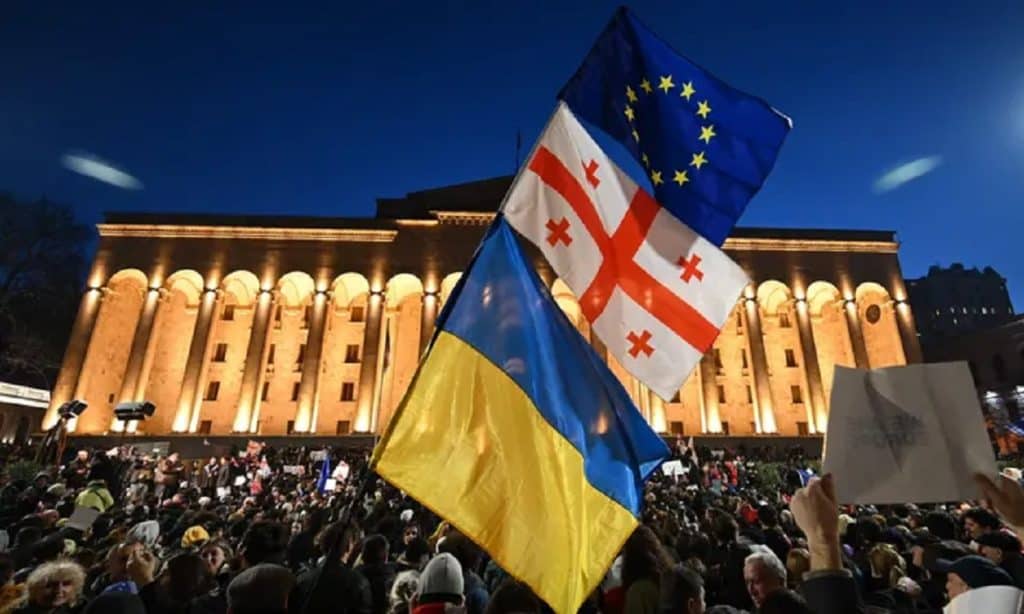By Anton Evstratov
The protests in Georgia, despite their media sophistication, provided largely by Western or pro-Western Georgian media, failed to achieve their main goal of undermining the ruling Georgian Dream party and the resignation of the government.

The rallies that began because of the threat of parliamentary adoption of the Foreign Agents Law, which endangered the activities of several media outlets and nonprofit organizations, quickly radicalized. The law mainly targeted opposition structures that have sharply criticized the government and its moderate line from pro-Western positions. Transparency International and the International Society for Fair Elections and Democracy, for example, could be included among the foreign agents.
The ruling party’s motivations for introducing the new law were eloquently expressed by ruling party chairman Irakli Kobakhidze, who said that external funding of organizations calling for the resignation of the current government was unacceptable to the authorities.
As early as March 7, opponents of the “Georgian Dream” course and the specific bill in question tried to storm the Parliament building. The protesters, judging from their numerous statements, meticulously collected and published by the media, had no doubts about the possibility of a pro-Russian law along the lines of a specific Russian model. At the same time, foreign agent laws, often much stricter than Russian ones, are in place in several Western countries, including the United States (the Foreign Agents Registration Act (FARA) was passed in the United States in 1938). Recently, a similar bill was also discussed by the European Parliament.
Although the project, which aroused such strong opposition in society, was soon rejected in parliament, protests continued in the days that followed, and the radical nature of the demands of activists gathered in downtown Tbilisi grew as their numbers dwindled. The result was demands for the government to resign and for Abkhazia and South Ossetia to return under Georgian jurisdiction. How this was to be done, the protesters did not elaborate specifically, but it was evidently to open a “second front,” after the Ukrainian one, in the struggle against Russia.
These demands and the clearly insufficient number of protesters ultimately played a key role in the defeat of the street protests and their inability to accomplish the maximum task (overthrowing the government). The fact is that despite all the problems and the declining popularity of the “ruling party,” it is obvious to a significant number of Georgian citizens that the pragmatic policy pursued by the “Georgian Dream” has no alternative.
Georgia objectively does not have the forces for a military confrontation with Russia, and the implementation of such a scenario could easily lead the Georgian army and the state as a whole to disaster. Moreover, Tbilisi’s accession to the main body of anti-Russian sanctions is also fraught with serious difficulties, since Russia is currently Georgia’s main trading partner. Bilateral turnover between the two countries for the first two months of 2023 is $467 million, almost double the same indicator from a year ago. This is not counting Russian tourism in Georgia, which brings significant profits to the country, and revenue from the transit of Russian goods to Armenia and Armenian goods to Russia.
That is why Georgian parliament speaker Shalva Papuashvili said that if Tbilisi had adhered to the sanctions Georgia would have received 10 percent economic growth instead of a 10 percent recession, which would have inevitably led the already poor republic into very serious problems, not only purely economic but also social.
Most Georgians, especially older generations and middle-aged people, remember the hungry and terrible 1990s and early 2000s, with the wars in Abkhazia and South Ossetia, civil war in Georgia itself, and rampant organized crime, and are unwilling to allow this to happen again. Not surprisingly, most of the radical protesters were young.
At the same time, it is obvious that in the event of the withdrawal of the Georgian Dream and the implementation of the aforementioned “conflict scenario,” Tbilisi will not come close to integration with the European Union, the failure of which the opposition blames on the current government: the EU simply does not need a poor state torn apart by internal strife and war with a strong neighbor because it cannot meet European standards.
Recall that in the summer of 2022 Georgia was denied EU candidate status because Tbilisi failed to meet a number of necessary conditions. The European Commission then recommended that the republic refine a number of areas, publishing a document tentatively titled “12 Recommendations.” This decision sparked anti-government demonstrations, which were not decisively successful.
In this regard, despite the political apathy and disappointment of a significant part of the population by all political forces, exit polls showing over 30 percent support for the Georgian Dream coalition are not surprising, while the coalition of opposition forces led by the United National Movement headed by the odious M. Saakshvili can boast over 7 percent of voters.
It should be noted that both Russia and Western countries have reacted to the developments in Georgia. On March 10, Russian Foreign Minister Sergei Lavrov pointed to the external origin of the Georgian protests, further calling their goal of uniting Georgia in a war with Moscow and comparing it to the 2014 Maidan in Ukraine. Russia could not fail to pay attention to the presence of Russian transferees among the protesters in Tbilisi, who have moved en masse to Georgia, but so far there has been no official response.
European diplomacy chief Joseph Borrelle said as early as March 7 that the bill that sparked the protests contradicted European norms and its adoption would damage relations between the European Union and Georgia.
The outcome of the Ukrainian confrontation and the situation in Russia will have a great influence on Georgian politics, as it will determine the overall situation in the region and Moscow’s policy toward the South Caucasus, and also the social realities within Georgia, which is experiencing the consequences of the mass relocation of Russians. At the same time, for the foreseeable future, the Georgian dream still has levers to control the situation in the country, and if Russia has the technical ability to influence the situation in the neighboring republic and the limited tools of Western countries, it will remain relatively favorable for the authorities and desirable for Moscow should the current situation be maintained.
Author: Anton Evstratov (Russian historian, journalist and journalist living in Armenia, lecturer at the Department of General History and Foreign Regional Studies at the Russian-Armenian University in Yerevan).
(The opinions expressed in this article are solely those of the author and do not necessarily reflect the views of World Geostrategic Insights)
Image Source: AFP







